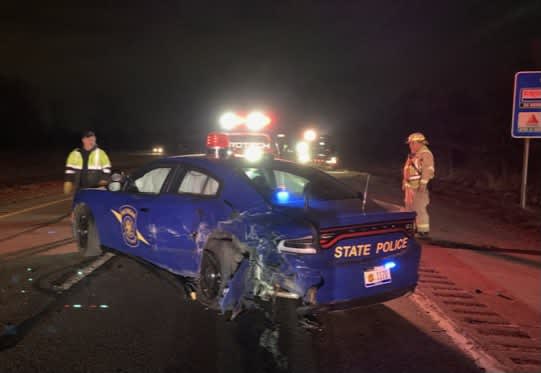A federal vehicle safety authority is asking Tesla to explain why it didn’t initiate a recall when it pushed a safety-related software update to customers in September.
The update enabled Tesla vehicles to better detect emergency vehicle lights in low light conditions, according to a letter from the National Highway Traffic Safety Administration to Tesla published to the government agency’s website on Wednesday.
Tesla’s “Emergency Light Detection Update” was delivered via an over-the-air software update to customers’ cars a few weeks after NHTSA initiated a probe into possible safety defects with Tesla Autopilot, the company’s standard, driver assistance package.
Tesla also sells a premium version of its driver assistance system under the brand name FSD, or Full Self-Driving, for $10,000 up front or $199 per month. None of Tesla’s systems make their cars safe for use without a human driver behind the wheel at all times. They are “level 2” driver assistance systems, not fully autonomous vehicle technologies.
As CNBC previously reported, NHTSA identified around a dozen collisions that involved Tesla drivers crashing into first responders’ vehicles while they were parked on the side of the road, typically at night or in the pre-dawn hours of morning. In each of the incidents identified by NHTSA, the Tesla drivers had Autopilot or traffic aware cruise control features engaged before the crash. One of the crashes resulted in a fatality.
NHTSA wants to know if Autopilot defects or design issues contributed to or caused those crashes. And now they also want to know if Tesla’s software update effectively served as a stealth recall.
If the agency deems Autopilot defective, it could mandate a recall and impact Tesla’s public image. Such a finding could also inspire greater urgency around rating and regulating driver assistance systems like Tesla’s.
Currently, NHTSA issues an annual New Car Assessment Program (NCAP) rating on the crashworthiness of vehicles sold in the US. NCAP ratings list features that are included in each vehicle, but the agency doesn’t yet rate the safety of, or limit the use of driver assistance systems like Tesla’s.
As part of its Tesla probe, NHTSA is evaluating 12 other car makers’ comparable systems.
NHTSA’s Gregory Magno the agency’s chief of vehicle defects division, told Tesla’s Director of Field Quality Eddie Gates in the new letter that automakers are required to notify NHTSA within five business days when they become aware of (or should have become aware of) safety issues in their vehicles that necessitate a fix.
Over-the-air software updates are covered by current federal recall laws, Magno emphasized.
The agency also asked Tesla for details on its expanding FSD Beta program.
The program gives Tesla owners who are not trained safety drivers a chance to test pre-release software, and new driver assistance features on public roads in the US. The FSD Beta software does not make Tesla vehicles driverless, and has not been de-bugged enough for general use and wide release.
Among other things, NHTSA requested detailed records on how Tesla rates and selects participants in the experimental, early access program.
Recently, Tesla added a “beta button” that allows any customer to request access to an FSD Beta download. It also released an insurance calculator that gives drivers seeking FSD Beta access a “safety score.”
Tesla owners who scored 100 over a week of driving at least 100 miles were given access to FSD Beta this week expanding the program by about 1,000 people, according to CEO Elon Musk who remarked on the number at an annual shareholder meeting last week.
Vehicle safety advocates, including the National Transportation Safety Board, have called on NHTSA to regulate systems like Tesla’s Autopilot, FSD and FSD Beta sooner rather than later.

stromectol south africa – buy candesartan 16mg for sale purchase carbamazepine pills
buy accutane 10mg pills – buy isotretinoin 20mg pills buy linezolid generic
order zithromax 250mg pill – buy generic bystolic over the counter cost bystolic
order prednisolone 40mg pill – cheap azipro 500mg order prometrium 100mg online cheap
buy gabapentin 600mg online cheap – order clomipramine for sale order sporanox pill
lasix over the counter – furosemide 40mg oral betnovate 20 gm us
buy augmentin generic – cymbalta 20mg price cymbalta 20mg tablet
brand tizanidine 2mg – order plaquenil pill hydrochlorothiazide for sale
viagra 100mg tablet – tadalafil 5mg drug cialis australia
usa pharmacy cialis – buy cialis 5mg sale viagra for sale
buy cheap generic cenforce – buy aralen pills for sale metformin 1000mg drug
order lipitor 40mg – buy atorvastatin 80mg pill zestril 2.5mg drug
order prilosec 20mg generic – omeprazole to treat esophagus order tenormin generic
purchase methylprednisolone – methylprednisolone 8 mg for sale order triamcinolone 4mg
purchase clarinex generic – purchase priligy without prescription dapoxetine 30mg tablet
purchase misoprostol generic – buy misoprostol pill order diltiazem without prescription
zovirax 400mg for sale – acyclovir 400mg tablet crestor without prescription
motilium 10mg oral – order sumycin 500mg online order cyclobenzaprine 15mg pill
inderal order online – buy plavix 75mg pills methotrexate sale
cheap nexium 40mg – buy topiramate 200mg online buy sumatriptan generic
buy levaquin 500mg generic – ranitidine over the counter buy zantac 150mg for sale
mobic us – order celebrex generic buy tamsulosin 0.4mg for sale
ondansetron 4mg brand – spironolactone 25mg uk zocor ca
valtrex 1000mg pills – buy fluconazole 100mg forcan online